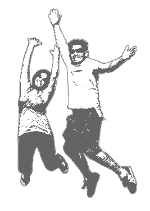It's been a few weeks now since we visited Auschwitz on our tour, and I have been having a difficult time figuring out how to write about the experience. I think in some ways I'm still processing everything that I saw and felt while we were there, but I'll try to describe some aspects that stuck out to me.
Our guide had noted that many people are "shattered" by the experience of visiting Auschwitz, so I had been emotionally preparing myself a couple of days prior to the visit. I remember having a knot in my stomach when we first drove up to the grounds and I saw the infamous barbed wire fences. When we arrived, though, it was initially completely different from what I had envisioned. Now technically a museum, It is overrun with tourists, and we had to wade through throngs of loud, noisy crowds just to get to the main lobby and get our headsets. And when you see high school students on a field trip, laughing and joking with each other, and tourists with their large cameras and selfie sticks (no, I'm not kidding), there is something about that atmosphere that led me to feel more detached than I initially anticipated.
When we walked through the grounds, I remember being struck again by how it was not quite what I expected to see. We happened to go on a beautiful, sunny day, and in the light Michael and I both commented how the red brick buildings could almost, in a weird way, resemble dormitories at a summer camp. It was a strange, confusing feeling. But that feeling fades as soon as you enter the buildings and see the starvation rooms and standing cells. The lab where female prisoners were brutally experimented on and sterilized. The execution wall. The small beds where sometimes as many 5 people slept. The place where 12 prisoners who tried to escape were publicly executed, their bodies hung in plain sight as a warning to the other prisoners. The gas chambers and the crematorium.
The entire visit profoundly affected me, but I remember a moment during our tour that particularly stayed with me. We were walking through the halls that displayed the possessions that were taken from the prisoners before they were killed. You see seemingly innumerable amounts of clothing, glasses, prosthetic items taken from the elderly and disabled, human hair, and perhaps the most heartbreaking, children's shoes. What affected me the most, though, was seeing a glass case showing the prisoners’ suitcases with their names written on the exteriors. It is incomprehensible to imagine exactly how many people died at Auschwitz, but all of a sudden, there are names attached to the nameless items. I had a moment of realization that each of these people had stories, and how lives and families were just ripped apart. I also teared up when we passed by a small display case featuring combs, shoe polish, and shaving brushes. There was just something about the utter simplicity of these objects that added to the heaviness and sadness of the whole experience.
We are all familiar with WWII history and know about the events that took place here. We have all seen the pictures, read the books, and learned the statistics. But for me, when I walked on those gravel paths and saw the buildings in person, I started to digest the reality that, "Wow, this all actually happened here". It feels utterly surreal. I was surprised that I was fairly composed during the tour, if not a bit numb. I think that's because it feels impossible to process exactly how much suffering and pain occurred there.
We have been snapping thousands of pictures throughout our travels, but we barely took any here. It just didn't feel necessary, or appropriate. So I'll share with you all the couple of pictures that we did take:
The infamous banner you see when you first enter the camp, that reads "Work will set you free".
I distinctly remember thinking once we climbed back into the tour bus that traveling, in so many ways, is such a privilege. Michael and I have gotten to see some incredibly beautiful sights, eat delicious local cuisine, meet interesting people, and immerse ourselves with new languages and customs and cultures. I am so, so appreciative of these opportunities and experiences. But I am equally, if not moreso, grateful for the opportunity to visit places like Auschwitz, where you are starkly confronted with some of the darkest and most horrific aspects of humanity, and forced to pause and reflect, sit with feelings of sadness and discomfort, and ask yourself difficult questions. Why did this happen? How could we, as human beings, do this to each other? And how can we prevent something as horrible as this from happening again?
Visiting Auschwitz was certainly not a comfortable or pleasant experience, but for me, it was a very necessary one. I cannot imagine having gone on this trip and not gone there. I think we owe it to the people who died there, and to those who continue to suffer at the hands of other similar human atrocities, to visit, learn, and perhaps mostly importantly of all, to remember.





